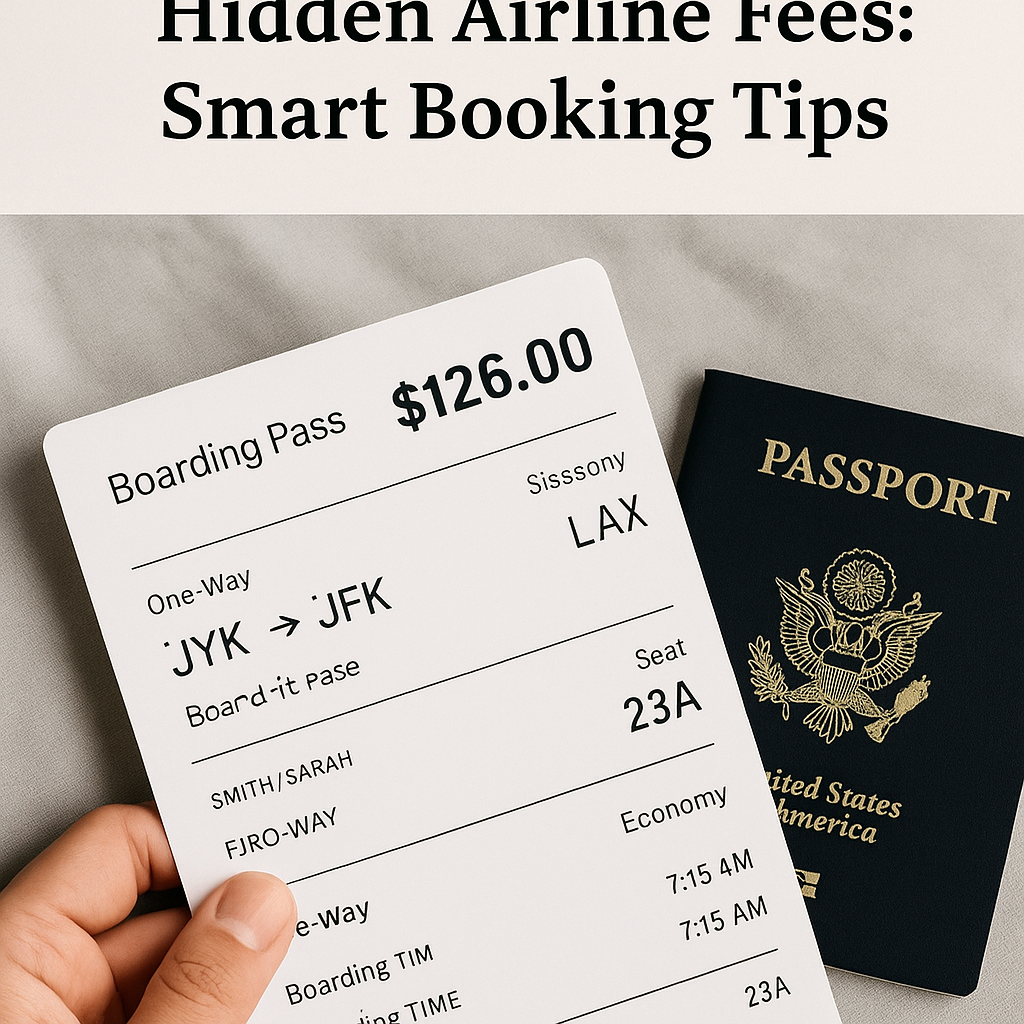Introduction:
In the age of ultra-low-cost carriers and dynamic pricing, scoring a cheap airfare has never been easier — or more misleading. You may think you’ve found a $29 flight, but by the time you add seat selection, carry-on baggage, airport fees, and taxes, the total can skyrocket to over $100. The truth is: hidden airline fees are one of the travel industry’s biggest profit machines.
In this guide, we’ll uncover the most common hidden airline fees and reveal practical strategies to avoid them, so you can keep your travel budget intact in 2025.
The Rise of Airline Fee Traps
Airlines now operate more like budget retailers than transportation companies. To keep base fares low and appear competitive in search engines, they’ve unbundled services and turned every add-on into a revenue opportunity.
Common Fee Types:
- Seat selection fees
- Carry-on and checked baggage fees
- Airport and fuel surcharges
- Ticket reissue/change/cancellation fees
- Boarding priority and check-in add-ons
- In-flight food, water, or even overhead bin access (yes, seriously)
Smart Booking Tip #1: Compare “Total Cost”, Not Just Base Fare
Many flight comparison tools show only the lowest fare, but fail to include all the extras.
Use meta-search engines like Google Flights, Skyscanner, or Kayak, and always click through to the airline’s final pricing page before booking.
Pro Tip:
Some airlines charge lower fees for services if you book them during the initial reservation vs. later at check-in or the airport.
Smart Booking Tip #2: Understand Fare Classes and Restrictions
Not all economy fares are equal.
Basic Economy may exclude even carry-on bags or prevent seat selection.
Tip: Always read the fare rules before confirming.
Comparison Example:
| Feature | Basic Economy | Standard Economy | Premium Economy |
|---|---|---|---|
| Carry-on Bag | ❌ | ✅ | ✅ |
| Seat Selection | ❌ | ✅ | ✅ |
| Refundable Option | ❌ | ❌ | ✅ |
| Frequent Flyer Miles | Partial | Full | Full |
Smart Booking Tip #3: Use Airlines’ Direct Booking Tools
Many airlines reserve their best promotions, fee waivers, and upgrade opportunities for those who book directly on their websites or mobile apps.
Plus, it’s easier to manage your booking, make changes, or access exclusive offers.
Bonus: Some airlines now offer “fare bundles” that include baggage, meals, and seat selection for one fixed price — often cheaper than adding them separately.
Smart Booking Tip #4: Pack Smarter to Avoid Baggage Fees
Over 70% of hidden costs come from luggage.
Here’s how to beat the system:
- Use ultra-lightweight luggage to stay under weight limits
- Wear your heaviest items (jackets, shoes) during check-in
- Use personal-item loopholes: many airlines allow a small bag (backpack or laptop case) even for Basic Economy
- Weigh your bags at home to avoid surprise fees at the airport
- Use apps like PackPoint or Baggage Pro to calculate weight & size limits by airline
Smart Booking Tip #5: Avoid Currency Conversion Traps
When booking international flights, always pay in the airline’s home currency if possible.
Dynamic Currency Conversion (DCC) often applies a worse exchange rate.
Example: Booking a Japan Airlines flight from the U.S. in USD may seem convenient, but paying in JPY on a card like Wise or Revolut can save you 3–5%.
Smart Booking Tip #6: Use Travel Credit Cards with Airline Perks
Many travel-focused credit cards waive fees for checked bags, priority boarding, or seat upgrades.
Popular options in 2025 include:
- Chase Sapphire Preferred
- Capital One Venture X
- American Express Platinum
- United, Delta, or Southwest co-branded cards
Warning: Don’t overuse credit cards to chase perks. Use them strategically based on your travel frequency.
Smart Booking Tip #7: Know Your Passenger Rights
Sometimes, what feels like a “fee” may actually be refundable or disputable.
Examples:
- Canceled flights = right to full refund (not just a voucher)
- Denied boarding due to overbooking = compensation rights
- Delays over 3 hours in EU = up to €600 refund under EC261 rule
Real-World Case Study: A $39 Flight That Became $126
Sarah booked a $39 one-way ticket from LAX to Vegas. Here’s how the fees stacked up:
- Seat Selection: $14
- Carry-On Bag: $25
- Airport Tax: $18
- Boarding Priority: $10
- Credit Card Processing Fee: $3
Total: $109 (before return flight)
After learning these tips, she rebooked with a bundled fare and saved $42.
Final Thoughts:
Airline fees aren’t going away. In fact, they’re increasing — silently.
But with the right booking strategy, you can beat the system.
By comparing total prices, booking smartly, packing wisely, and using the right cards, you’ll avoid unexpected costs and travel like a pro in 2025.
Don’t fall for fake low fares. Book smart, fly smarter.
